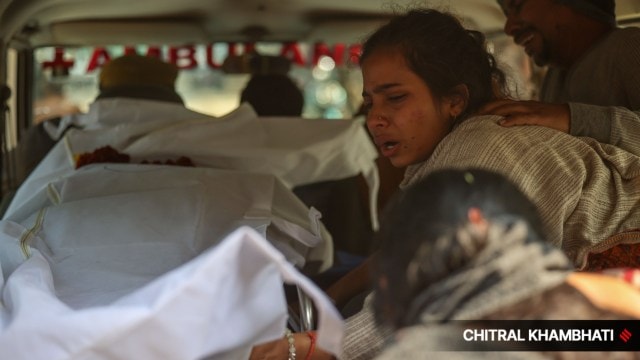‘It was like seeing death up close’ – Stampede victims’ families describe the bedlam at Maha Kumbh
The official death toll in the Maha Kumbh stampede, which took place in the early hours of Wednesday, currently stands at 30, while 60 are wounded.
 Family members of Maha Kumbh stampede victims break down, on Wednesday. (Express Photo/Chitral Khambati)
Family members of Maha Kumbh stampede victims break down, on Wednesday. (Express Photo/Chitral Khambati) Surendra Goud, in his 60s, regrets that his wife Tara Devi ever decided to go to the Maha Kumbh in Prayagraj. One of the victims of Wednesday’s stampede there, Tara Devi, 65, was part of a large group of 10 people from village Ram Nagar in the Bhorey subdivision of Bihar’s Gopalganj who went to the Kumbh.
“As several women from our neighbourhood had been going to Prayagraj from Gopalganj, my wife also accompanied them. Now that we lost her, we realise that there was no need to go there,” he says.
Tara Devi is one of eight victims from Bihar who lost their lives in the crush that occurred during the ‘Amrit Snan’, or holy dip, undertaken on the occasion of “Mauni Amavasiya”. The official death toll in the stampede, which took place in the early hours of Wednesday, currently stands at 30, while 60 are wounded.
 At least 30 people were killed and 60 injured in a stampede at the Sangam area of the Maha Kumbh. (Express Photo/Chitral Khambati)
At least 30 people were killed and 60 injured in a stampede at the Sangam area of the Maha Kumbh. (Express Photo/Chitral Khambati)
All eight of Bihar’s victims were women, with four of them being from Gopalganj.
Among them was Siya Devi (62) from Maner, Patna. He husband Rajendra Rai says: “I wish some male members had accompanied her and avoided going to Sangam Nose during the rush hour”.
In Uttarakhand’s Udham Singh Nagar, the Kohlis are in deep mourning. The family was just returning from a holy dip when a crowd overwhelmed them. In the bedlam that followed, the family, which was holding hands until then, accidentally let go of the Guddi Devi, losing her in the crowd.
The next three hours saw them frantically searching for her.
 Adityanath ordered a three-member judicial probe to find the reasons that led to the stampede, apart from a separate police inquiry. (Express Photo/Chitral Khambati)
Adityanath ordered a three-member judicial probe to find the reasons that led to the stampede, apart from a separate police inquiry. (Express Photo/Chitral Khambati)
“There were just too many people and the administration and police could not control them. When our mother went missing, no one came to their rescue. Each devotee in the vicinity was focused on finding their loved ones. Around 6 am, someone told them that bodies were taken down to the road below,” Guddi Devi’s son Rajeev Kohli says now.
There, lined on that road among others, was his mother’s lifeless body. He quickly took her to a nearby hospital, where she was declared dead. “She was very healthy and had no diseases. By 2.30 pm, we got a government ambulance and reached home this morning,” he says.
In Kolkata’s Bijoygar, the Poddars are still in deep shock at the death of their 60-year-old mother Basanti Poddar. It was she who wanted to go to Prayagraj, her son Sourav says. “If not for my mother, I wouldn’t have gone,” he says.
Sourav describes the scenes in chaos and disarray at the Sangam ghat – the site of the stampede – as “seeing death up close”.
 A kin of a victim in Parayagraj on Wednesday. Following the stampede, Uttar Pradesh Chief Minister Yogi Adityanath issued a slew of guidelines on crowd management, tExpress Chitral Khambati)
A kin of a victim in Parayagraj on Wednesday. Following the stampede, Uttar Pradesh Chief Minister Yogi Adityanath issued a slew of guidelines on crowd management, tExpress Chitral Khambati)
“We had gone for a dip. Suddenly, we saw a huge rush, and there was no one from the Uttar Pradesh Police or the state administration or volunteers in sight., There was utter chaos and it was completely disorganised. There were no lines and we were standing but it was suffocating because there was no crowd management and there were far more people than capacity. The someone pushed us and we all fell down, and then I don’t remember anything else,” he says.
As more and more people fell on him, he lost sight of the rest of his family. Eventually, he managed to extricate himself and find his sister and aunt, but his mother was still missing.
“By this time, the police were there, so I asked them for help. They gave us a car and told us to go to a hospital for first aid because we were all injured. I couldn’t even take my mother to the hospital. She died at the ghat,” he sobs.
Among those who lost their lives is Nitiranjan Roy, a 63-year-old proprietor of a sweetmeat shop in Hailakandi – a town in Assam’s Barak Valley. He had arrived at Prayagraj on January 25 as part of a large group of 21 comprising both immediate and extended family members – including his brothers.
 A child waiting for his family member at Maha Kumbh. (Express Photo/Chitral Khambati)
A child waiting for his family member at Maha Kumbh. (Express Photo/Chitral Khambati)
“Some members of our family have gone to Kumbh Mela earlier but this time was more auspicious because this will happen next only 144 years later,” his younger brother Taposh Roy, who is currently in Prayagraj waiting to take his brother’s body back home, says. “So, we went together hoping for good but we will return with tragedy.”
On Tuesday, the family, who was staying in separate tents at the Kumbh, had split up after some relatives decided to get a headway and make their way to the ghat before the others. Niranjan was among them.
On their way, however, the group fell down and were trampled on. While the others eventually got up, Niranjan lay lifeless.
 Family members of stampede victims break down at Maha Kumbh. (Express Photo/Chitral Khambati)
Family members of stampede victims break down at Maha Kumbh. (Express Photo/Chitral Khambati)
“He was just lying there for a long time because there was no ambulance to take him to the hospital. We pleaded with the police saying that we would carry him ourselves but they told us to wait. When he was taken by the police, we couldn’t go with him,” Roy says.
In Uttarakhand, Kohli blames the incident on mismanagement and lack of crowd control. His mother’s funerary rites were held earlier Thursday.
“First, there was no crowd control. When my mother went missing, there was no one to help. To bring her back to Uttarakhand, we had to wait for eight hours before an ambulance could be arranged,” he says.







